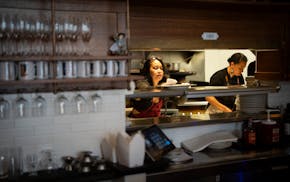It was a Sunday night, the end of a long week, and Soleil Ramirez's nerves were frayed.
As chef and owner of Crasqui, a Venezuelan restaurant in St. Paul, she only had one more dinner shift to finish the week.
Her team was in place, her ingredients prepped and ready to go into dishes evoking the Caribbean island after which the restaurant is named.
And then, none of the people with reservations came.
Not the party of eight celebrating a special occasion. Not the table for four, nor the three-top that booked in advance.
Ramirez had three cooks lined up to handle those 15 diners along with the roughly 25 walk-ins she expected. She brought in a server solely to attend to the party of eight and one other table that didn't arrive.
"He came here for nothing," Ramirez said.
Her frustration that December night was the tipping point that took her to social media to vent about a chronic problem facing the restaurant business — no-shows.
"This Needs to Be Said," she began in a screed against the customers who don't call or send a message to cancel.
"This isn't just disappointing; it's deeply disrespectful," she wrote. "Nights like this make us question if it's all worth it."
That evening, she cried at the number of empty seats.
"You start to question yourself, like, what I'm doing wrong, why nobody wants to come here," Ramirez told the Minnesota Star Tribune. "And it breaks my heart to see my employees staying here without making any money."
Other Twin Cities restaurant owners say no-shows make them feel "disposable," like a "commodity," or a "throwaway thing."
That's why more restaurants, like Crasqui, are asking for customers' credit card information.
Before you can hit submit on a new reservation, online portals such as OpenTable and Tock many times require a credit card number the restaurant owner may charge if the diner does not show up. Terms vary, with fees from $10 to $40 per person in some cases. In others, restaurants may require the full cost of the meal.
It may be the only recourse restaurants have to combat the wasted time, space and food from no-shows.
A hurdle to profitability
Independent restaurants in the Twin Cities are already feeling pinched, between soaring food prices, recent increases in minimum wage and the overall costs of doing business. No-shows and last-minute cancellations, fueled by the flexibility of online reservations portals, are one more hurdle in the way of profitability. Empty seats can be hard to fill with walk-ins, especially in slower winter months or on holidays like Valentine's Day, when other potential customers assume they won't be able to get in.
"It's both disrespectful to people on the waitlist, and it also makes a huge impact on our staff and in our bottom line," said Karyn Tomlinson, chef and owner of Myriel in St. Paul. "We have so few seats in our dining room that every table really counts."
It's been more than 25 years since software like OpenTable made it possible for reservations to go online, and only a decade since the advent of platforms such as Tock and Resy. With no need for a phone call, they're almost entirely in the hands of customers.
With some online maneuvering, a customer can snag a reservation at multiple places on the same night, and decide last-minute where they'd like to go — without ever interacting with a human.
Restaurant owners know not all no-shows have bad intentions. When customers call about a family emergency, a delayed plane or even a canceled babysitter, they understand.
Since opening in 2021, Myriel has charged in advance for its multicourse tasting, essentially treating it like concert tickets. The bookings are nonrefundable, but the restaurant will work with customers to reschedule.
About six months ago, Myriel instituted a $25 no-show fee for regular, a la carte reservations, too.
"We struggled," Tomlinson said. "I felt like maybe that was inhospitable, but then I came to the conclusion that it really helps. We're not wanting to punish people, per se. It's just gently reminding our community that this is special, there are humans involved in this, and these are people's livelihoods.
"Dining out is not just a throwaway thing," she said.
A tool for restaurants
Prepaid fine-dining bookings, like the ones for Myriel's tastings, are up 67% over last year on Tock, according to data provided by a spokesperson.
OpenTable found that when it began offering restaurants the option to collect a deposit on reservations, no-shows went down by 50%. It also created a "four strikes and you're out policy" that suspends users who don't show up for a reservation four times.
Tock also provides a guide for restaurant owners on dealing with no-shows. Credit card holds on reservations was the top suggestion; others include requiring deposits, using automated email and text messaging to remind guests of their reservations, and calling larger parties to confirm. But none offer a guarantee.
At Gia, a 54-seat restaurant in south Minneapolis, "we always try to ring to get a verbal confirmation," said chef and co-owner Jo Seddon. "I would say we're relatively high-touch on calling and contacting you, but if you're a big operation, that's not really feasible."
The restaurant requires a credit card number for all reservations, and will charge a $10 no-show or last-minute cancellation fee. The amount goes up for holidays. Even with the threat of a $75 fee, Gia had six or eight no-shows on New Year's Eve.
But almost every no-show that was charged disputed the transaction with their bank. Many times, the restaurant had to refund the money.
"In the end it was like, well, what's the point?" Seddon said. "It's a frustration, because we don't seem to have a leg to stand on, and it is quite a lot of admin work to go through the process. It's not great for us, either."
Despite the problems that come with impersonal online booking systems, Seddon said the benefits of those sites still outweigh the drawbacks. "The convenience factor is great, and what these portals offer really is a great service."
As technology improves, booking services can provide even more tools to restaurant owners to collect prepayments, place credit card holds, or even track repeat offenders.
"These trends all point toward the same conclusion — the industry is moving toward more secure, transparent booking practices that protect both restaurants and diners," the Tock spokesperson said.
Last Valentine's Day, Crasqui didn't yet require a credit card hold. There were 100 reservations for the evening, "and at the end of the night, we did like 65 covers because the rest didn't even show," Ramirez said.
That's when she decided to switch to OpenTable, and instituted a $25 per person cancellation fee. But after that night of 15 no-shows, "now I require $40, and I don't care," she said.
She hopes the more expensive fee will be a stronger deterrent to no-shows this Valentine's Day, which should be one of the year's best nights.
"We'll see what happens," she said.
This is one of an occasional series of stories about the challenges facing the Twin Cities restaurant industry.
Review: 'Between Riverside and Crazy' socks it to you and more

Quarterdeck Resort's stylish revamp is part of a boutique wave in Minnesota lake country

The newest Karate Kid fell in love with movies while growing up in Minnesota

What's new at Minnesota resorts this summer

